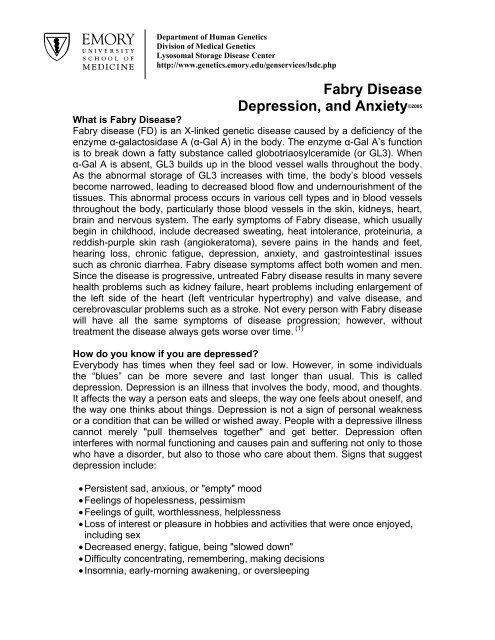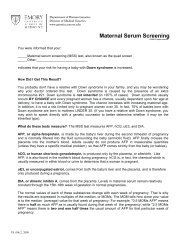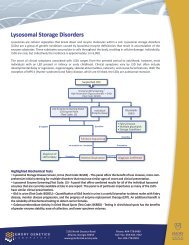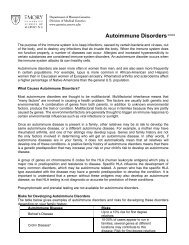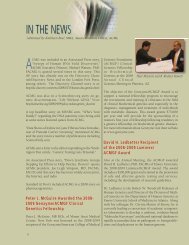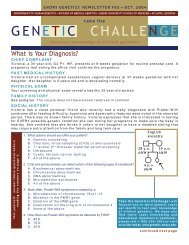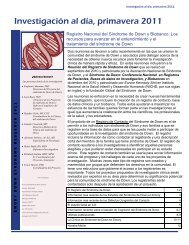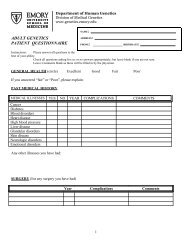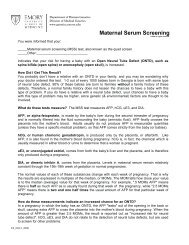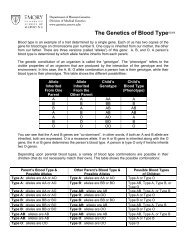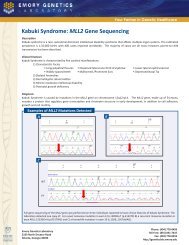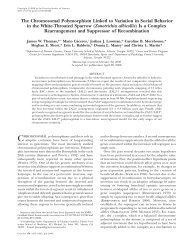Fabry Disease and Psychological Issues - Emory University ...
Fabry Disease and Psychological Issues - Emory University ...
Fabry Disease and Psychological Issues - Emory University ...
You also want an ePaper? Increase the reach of your titles
YUMPU automatically turns print PDFs into web optimized ePapers that Google loves.
Department of Human Genetics<br />
Division of Medical Genetics<br />
Lysosomal Storage <strong>Disease</strong> Center<br />
, http://www.genetics.emory.edu/genservices/lsdc.php<br />
<strong>Fabry</strong> <strong>Disease</strong><br />
Depression, <strong>and</strong> Anxiety ©2005<br />
What is <strong>Fabry</strong> <strong>Disease</strong>?<br />
<strong>Fabry</strong> disease (FD) is an X-linked genetic disease caused by a deficiency of the<br />
enzyme α-galactosidase A (α-Gal A) in the body. The enzyme α-Gal A’s function<br />
is to break down a fatty substance called globotriaosylceramide (or GL3). When<br />
α-Gal A is absent, GL3 builds up in the blood vessel walls throughout the body.<br />
As the abnormal storage of GL3 increases with time, the body’s blood vessels<br />
become narrowed, leading to decreased blood flow <strong>and</strong> undernourishment of the<br />
tissues. This abnormal process occurs in various cell types <strong>and</strong> in blood vessels<br />
throughout the body, particularly those blood vessels in the skin, kidneys, heart,<br />
brain <strong>and</strong> nervous system. The early symptoms of <strong>Fabry</strong> disease, which usually<br />
begin in childhood, include decreased sweating, heat intolerance, proteinuria, a<br />
reddish-purple skin rash (angiokeratoma), severe pains in the h<strong>and</strong>s <strong>and</strong> feet,<br />
hearing loss, chronic fatigue, depression, anxiety, <strong>and</strong> gastrointestinal issues<br />
such as chronic diarrhea. <strong>Fabry</strong> disease symptoms affect both women <strong>and</strong> men.<br />
Since the disease is progressive, untreated <strong>Fabry</strong> disease results in many severe<br />
health problems such as kidney failure, heart problems including enlargement of<br />
the left side of the heart (left ventricular hypertrophy) <strong>and</strong> valve disease, <strong>and</strong><br />
cerebrovascular problems such as a stroke. Not every person with <strong>Fabry</strong> disease<br />
will have all the same symptoms of disease progression; however, without<br />
treatment the disease always gets worse over time. (1)<br />
How do you know if you are depressed?<br />
Everybody has times when they feel sad or low. However, in some individuals<br />
the “blues” can be more severe <strong>and</strong> last longer than usual. This is called<br />
depression. Depression is an illness that involves the body, mood, <strong>and</strong> thoughts.<br />
It affects the way a person eats <strong>and</strong> sleeps, the way one feels about oneself, <strong>and</strong><br />
the way one thinks about things. Depression is not a sign of personal weakness<br />
or a condition that can be willed or wished away. People with a depressive illness<br />
cannot merely "pull themselves together" <strong>and</strong> get better. Depression often<br />
interferes with normal functioning <strong>and</strong> causes pain <strong>and</strong> suffering not only to those<br />
who have a disorder, but also to those who care about them. Signs that suggest<br />
depression include:<br />
• Persistent sad, anxious, or "empty" mood<br />
• Feelings of hopelessness, pessimism<br />
• Feelings of guilt, worthlessness, helplessness<br />
• Loss of interest or pleasure in hobbies <strong>and</strong> activities that were once enjoyed,<br />
including sex<br />
• Decreased energy, fatigue, being "slowed down"<br />
• Difficulty concentrating, remembering, making decisions<br />
• Insomnia, early-morning awakening, or oversleeping
• Appetite <strong>and</strong>/or weight loss or overeating <strong>and</strong> weight gain<br />
• Thoughts of death or suicide; suicide attempts<br />
• Restlessness, irritability, <strong>and</strong> anger<br />
• Persistent physical symptoms that do not respond to treatment, such as<br />
headaches, digestive disorders, <strong>and</strong> chronic pain. (4)<br />
Not everyone who is depressed experiences every symptom listed above. Some<br />
people experience a few symptoms, some many. Severity of symptoms varies<br />
with individuals <strong>and</strong> also varies over time. Men affected by depression may<br />
appear to be irritable, angry, <strong>and</strong> discouraged rather than sad. A depressed child<br />
may pretend illness, refuse to go to school, get into trouble at school, cling to a<br />
parent, or worry that the parent may die. Many individuals with <strong>Fabry</strong> disease are<br />
affected by depression. (3,7) Depression is a symptom of <strong>Fabry</strong> disease <strong>and</strong> is<br />
treatable.<br />
What signs indicate that you are anxious?<br />
Many people feel anxious before exams, presentations, or first dates. Individuals<br />
affected by anxiety disorders have constant, unremitting worry <strong>and</strong> fears about<br />
everyday activities. Signs <strong>and</strong> symptoms of an anxiety disorder include:<br />
• Trembling or feeling shaky<br />
• Muscle tension, aches or pains<br />
• Restlessness<br />
• Shortness of breath or feeling smothered<br />
• Increased heart rate<br />
• Sweating or cold/clammy h<strong>and</strong>s<br />
• Dry mouth<br />
• Lightheadedness<br />
• Hot flashes or chills<br />
• '”Lump in throat' sensation<br />
• Nausea, diarrhea or abdominal distress<br />
• Feeling keyed up or unable to relax<br />
• Easily startled<br />
• Poor concentration<br />
• Trouble falling asleep or staying asleep<br />
• Irritability<br />
Anxiety disorders also often involve anticipating the worst, even though there is<br />
little reason to expect things to go badly. (5) Individuals with <strong>Fabry</strong> disease are<br />
often affected by anxiety.<br />
What are panic attacks?<br />
Panic attacks are repeated episodes of intense fear that strike often <strong>and</strong> without<br />
warning. Symptoms of Panic attacks include any of the anxiety symptoms listed<br />
above plus:
• fear of dying<br />
• fear of going crazy<br />
• chest pains<br />
• feeling like you are not yourself or that things are not really happening to you<br />
• numbness/tingling sensations<br />
• feeling like you are choking<br />
Panic attacks can occur at any time, even during sleep. An attack generally<br />
peaks within 10 minutes, but some symptoms may last much longer. You may<br />
genuinely believe you're having a heart attack or losing your mind, or on the<br />
verge of death. Panic attacks can be part of <strong>Fabry</strong> disease, <strong>and</strong> should be<br />
addressed, not ignored. (6)<br />
How is depression treated?<br />
Appropriate treatment can help most people who suffer from depression. Current<br />
treatments include medications <strong>and</strong> talk therapies with therapists that ease the<br />
impact of depression. The first step in determining a treatment path is a<br />
psychological evaluation by a psychiatrist <strong>and</strong>/or a psychologist. A diagnostic<br />
evaluation will include a complete history of symptoms such as: when they<br />
started, how long they have lasted, how severe they are, whether the patient had<br />
them before <strong>and</strong>, if so, whether the symptoms were treated <strong>and</strong> what treatment<br />
was given. .(4) In individuals affected by <strong>Fabry</strong> disease, studies have shown that<br />
treatment with enzyme replacement therapy (ERT) does improve emotional as<br />
well as physical health. .(2)<br />
How is anxiety treated?<br />
Appropriate treatment can help most people who suffer from anxiety. Current<br />
treatments include medications <strong>and</strong> talk therapies with a psychologist. A number<br />
of medications that were originally approved for treating depression have been<br />
found to be effective for anxiety disorders as well. If one medication is not<br />
effective, others can be tried. In individuals affected by <strong>Fabry</strong> disease, studies<br />
have shown that treatment with ERT does improve emotional as well as physical<br />
health. .(2)<br />
How are panic attacks treated?<br />
Effective treatments for panic disorders are available in the form of medications<br />
<strong>and</strong> psychotherapy. These treatments are similar to those used to treat<br />
depression <strong>and</strong> anxiety.<br />
What should I do if I think I am depressed, anxious, or having panic<br />
attacks?<br />
Seek help. Help can be found from your physician <strong>and</strong> your family. All of these<br />
conditions have treatments if you are willing to seek them out. Remember that<br />
depression <strong>and</strong> anxiety can make some people feel like giving up. It is important<br />
to realize that these negative views are part of the disease <strong>and</strong> typically do not
accurately reflect the actual circumstances. Negative thinking fades as treatment<br />
begins to take effect. The <strong>Emory</strong> LSDC has several psychologists <strong>and</strong><br />
psychiatrists skilled in treating <strong>Fabry</strong> related depression, anxiety, <strong>and</strong> panic<br />
attacks. Please call us at 404-778-8565 or 800-200-1524 if you would like a<br />
referral for any of these conditions. We want to help you get the treatment you<br />
need.<br />
Where can I find out more information on <strong>Fabry</strong> disease, depression, <strong>and</strong><br />
anxiety?<br />
The National Institutes of Mental Health website on Depression, Anxiety,<br />
<strong>and</strong> Panic Disorders/Attacks<br />
http://www.nimh.nih.gov/publicat/adfacts.cfm<br />
http://www.nimh.nih.gov/publicat/depression.cfm<br />
http://www.nimh.nih.gov/HealthInformation/panicmenu.cfm<br />
<strong>Fabry</strong> Support & Information Group (FSIG)<br />
108 NE 2nd Street, Suite C, P.O. Box 510, Concordia, MO 64020<br />
Phone: (660) 463-1355<br />
Internet: http://www.fabry.org/<br />
The <strong>Emory</strong> Lysosomal Storage <strong>Disease</strong> Center<br />
2165 North Decatur Road, Decatur, GA 30033<br />
Phone: 404-778-8565 or 800-200-1524<br />
Internet: http://www.genetics.emory.edu/genservices/lsdc.php<br />
References:<br />
1. Desnick RJ, R Brady, J Barranger, AJ Collins, DP Germain, M Goldman, G Grabowski, S<br />
Packman, <strong>and</strong> WR Wilcox. <strong>Fabry</strong> <strong>Disease</strong>, an Under-Recognized Multisystemic Disorder: Expert<br />
Recommendations for Diagnosis, Management, <strong>and</strong> Enzyme Replacement Therapy. Ann Intern<br />
Med. 2003; 138:338-346.<br />
2. Eng CM, NG Guffon, WR Wilcox, DP Germain, P Lee, S Waldek, L Caplan, GE Linthorst, RJ<br />
Desnick for International Collaborative <strong>Fabry</strong> <strong>Disease</strong> Study Group. N Engl J Med; 345(1): 9-16.<br />
3. Grewal RP. Psychiatric disorders in patients with <strong>Fabry</strong>'s disease. Int J Psychiatry Med.<br />
1993;23(3):307-12.<br />
4. National Institute of Mental Health. Depression. 2000. Bethesda (MD): National Institute of Mental<br />
Health, National Institutes of Health, US Department of Health <strong>and</strong> Human Services; (NIH<br />
Publication No. 3561). edited 4/9/2004. http://www.nimh.nih.gov/publicat/depression.cfm<br />
5. National Institute of Mental Health. Anxiety. 2000. Bethesda (MD): National Institute of Mental<br />
Health, National Institutes of Health, US Department of Health <strong>and</strong> Human Services; (NIH<br />
Publication No. 3879). edited 4/9/2004. http://www.nimh.nih.gov/publicat/anxiety.cfm<br />
6. National Institute of Mental Health. Panic Disorders. 1999. Bethesda (MD): National Institute of<br />
Mental Health, National Institutes of Health, US Department of Health <strong>and</strong> Human Services; (NIH<br />
Publication No. OM-99 4155 (Revised). edited 4/9/2004.<br />
http://www.nimh.nih.gov/publicat/panicfacts.cfm<br />
7. Sadek J, R Shellhaas, CS Camfield, PR Camfield, <strong>and</strong> J Burley. Psychiatric findings in four<br />
female carriers of <strong>Fabry</strong> disease. Psychiatr Genet. 2004; 14: 199-201.


